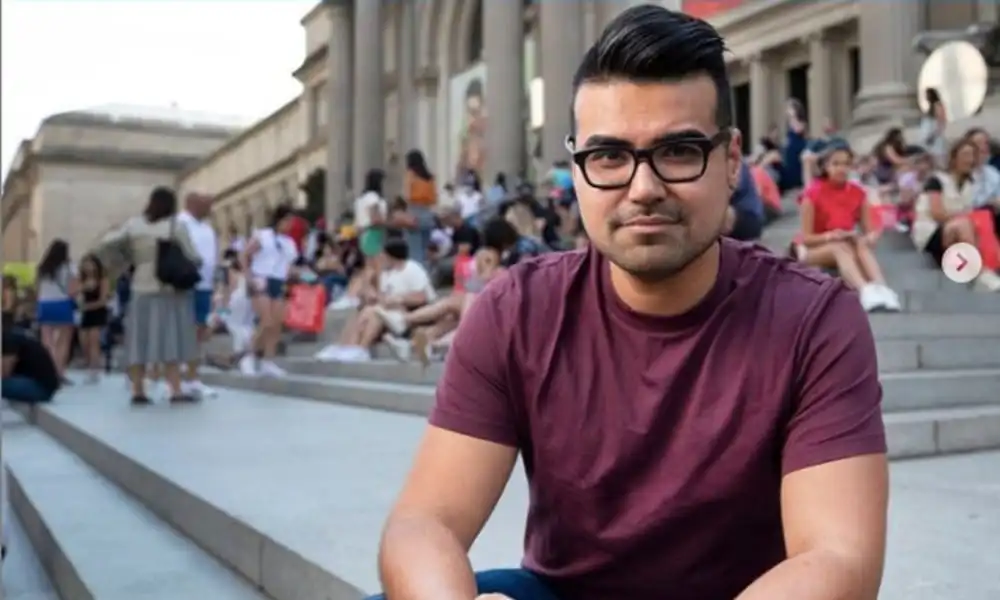ABC News’ Tony Morrison had lived with HIV in secret for years (Instagram/@thetonymorrison)
ABC News producer Tony Morrison has publicly shared his HIV status in a powerful, poignant essay written on the eight-year anniversary of his diagnosis.
Morrison, 31, revealed his battle with the illness for the first time on Tuesday (24 August) after keeping it secret for the best part of a decade.
He explained that it took him eight years and a global pandemic to be able to “articulate those words confidently and put to paper,” but now he’s finally ready.
“Not a day has gone by that I didn’t feel shame, fear, guilt and often, anguish,” he began. “And I have lived every single one of those days carrying a weight of humiliation, because that’s what society told me I should feel; that’s what our society told me I deserved.
“And I know that’s what society has probably whispered to you too, about people like me. I allowed myself to think my shame was justified. I accepted a life as a degenerate. And I convinced myself I could never be worthy of love.
“For eight years, I dealt with my diagnosis in hiding and I grieved in silence. Until now.”
Morrison said the “devastating diagnosis” came when he was 23, months after moving to New York from a small town in Florida. He’d just come out as gay and was looking forward to his new life in the city.
“I was free from hiding, so I thought, and was determined to finally live the life I had always wanted,” he said. “I felt like I could finally be me.”
At the time his friends and many gay New Yorkers would get tested for HIV at mobile testing stations outside bars. Out of curiosity Morrison decided to order an at-home test, never expecting the worst.
“It was as awful as you think it would be,” he recalled.
How could I tell my mom the nightmare of having a gay son was realised in this way?
“I stared at the test result endlessly and I felt completely numb and devoid of emotion. Before I could process anything, my thoughts spiralled and I immediately internalised it all. I told myself I couldn’t cry.
“Would my life ever be the same? Are my days on the planet numbered? How could I tell my mom the nightmare of having a gay son was realised in this way?”
Morrison kept the news to himself for three “excruciating” days before he broke down and told his closest friends. They responded with love but were equally as dumbfounded, not knowing how to deal with the positive result.
Next came a barrage of appointments with doctors and specialists before Morrison landed in the care of a doctor he’ll never forget.
“She was kind and patient and was the first to assure me that my life had only just begun. Most of all, she told me that I wasn’t alone,” he said.
This doctor explained the concept of “U=U”: “Undetectable = Untransmittable,” meaning that with proper medication and treatment, HIV can be brought down to “undetectable” levels so there is virtually no risk of passing it on.
I refuse to sulk in shame any longer.
Morrison slowly began to understand that HIV was not the death sentence he’d imagined it to be and that he could have a long, normal life while carrying the virus.
Sadly, not everyone can accept that. “Dating in particular, would never be the same,” he said.
He became an expert at “dodging stings and comments that made me feel less-than”, enduring a constant stream of embarrassment, hurt, disappointment and rejection in love and in life.
The constant rejections led him to stop dating for a while, eventually realising that although there’s never a “right time” to disclose his illness, “there are the right people to share it with.”
It’s taken him years to find peace with his diagnosis, but after quarantine gave him time to reflect he’s now reached a place where he can say he’s not just living with HIV, he’s thriving.
“You will never hear me say that I am ‘HIV-positive.’ You will always hear me say, ‘I am living with HIV.’ Because living is what I’ve found I can do best,” Morrison said.
“Living is what I owe to those who aren’t here with us anymore. Living is what I owe myself when I am in the darkest of places.
“I refuse to sulk in shame any longer.”
